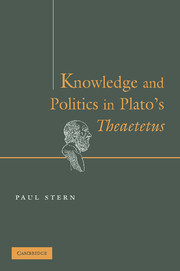6 - The Digression
Published online by Cambridge University Press: 23 October 2009
Summary
Introduction
The Digression begins with Theodorus reminding Socrates that they are at leisure, to which Socrates replies, “we appear to be (172c3, emphasis added).” Socrates knows he is on the threshold of a very unleisurely epoch in his life. At the center of the upcoming turmoil, and of this dialogue, is the conflict between the philosophic and political lives that Socrates now explores. His examination of this issue elaborates, in particular, on those necessities of political life that intrude on the Theodoran hope for a life of leisurely freedom. We have already seen Theodorus' desire to be free of those harsh necessities, but it intensifies in the Digression (172e2, d1–2, d4, d5, d8, e1–5, 173a4–5, 173b6). Fueling this hope, a hope evident also in Protagoras' outlook, is the possibility that speech can secure one's freedom from these necessities, that it can provide the leisure to do whatever one pleases.
Much to Theodorus' delight, Socrates does juxtapose the freely flying Philosophers to the slavish participants in political life. Socrates' exaltation of the philosophic life enflames Theodorus' desire to such a degree that he envisions on the horizon the possibility that Socrates' speech could bring about “more peace and fewer evils among human beings (176a3–4).” Yet, just as this reign of perpetual peace is about to dawn, Socrates brings Theodorus smack against a most profound necessity. Evil, Socrates asserts, is a necessary concomitant of good and, as such, can never perish. Evil is ineradicable.
- Type
- Chapter
- Information
- Knowledge and Politics in Plato's Theaetetus , pp. 162 - 182Publisher: Cambridge University PressPrint publication year: 2008

